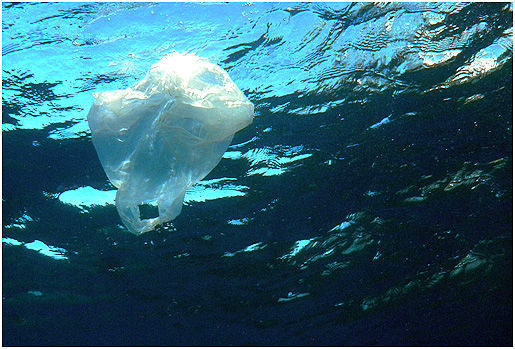Communities try to escape the plastic bag trap

The single-use plastic shopping bag is creating pollution problems that harm marine life, because of the huge number thrown away every day, some becoming litter that ends up in waterways.
A few communities have moved to either ban plastic bags, which are used on average for 15 minutes before they are tossed, or charge shoppers extra for them. The hope is people will use reusable bags made of materials such as canvas.
“There are millions of plastic bags in the ocean,” where they degrade into microplastics that are eaten by fish, then move up the food chain to humans, said Tim Dillingham, executive director of the American Littoral Society in Highlands, Monmouth County.
Fish evolved to see things floating in the ocean as food, he said.
Shoppers in Harvey Cedars will say goodbye to plastic bags from stores June 1, when the tiny borough follows Long Beach Township in banning them. Long Beach Township’s ban went into effect May 1.
“We only have 22 businesses in town,” said Harvey Cedars Commissioner Judith E. Gerkens, who said she has not gotten complaints from business owners.
The borough is giving out free reusable bags to people who buy beach tags, as well as at craft and art shows.
Those two communities have relatively few stores, said Michael Hart, who owns Surf City 5 & 10 on Long Beach Boulevard in Surf City. The largest number on Long Beach Island are in Surf City, Ship Bottom and Beach Haven, he said.
He already has switched to a more eco-friendly recycled plastic bag from Eco Hippo, and next year plans to try a bring-your-own bag policy.
Paper bags cost about 8 cents each, while plastic is just 2 cents each and the Eco Hippo bag about 3 cents each.
“We have almost a quarter-million customers here. The cost is overwhelming,” Hart said of providing about 300,000 bags a season.
Stafford Township is the shopping mecca of southern Ocean County, home to many large chain stores and dozens of restaurants and small businesses. It has introduced an ordinance to ban single-use plastic bags, said Mayor John Spodofora.
Spodofora is a scuba diver and surfer who has seen plastic bags hung up on shipwrecks, he said.
“The response (from businesses) was, ‘We kind of expected it.’ We are not getting any pushback at all, and the community seems very much in favor of it,” Spodofora said.
Plastic bags also cost taxpayers extra money to handle as waste.
They cannot be recycled through the county recycling center, where they cause problems for the machinery, said Spodofora. He has seen estimates that plastic bags account for one 10th of 1 percent of the material at recycling centers, but 20 percent to 30 percent of the labor costs.
“They have to shut down the sorters and get guys in there and cut the plastics away” when they get entangled, Spodofora said.
So a plastic bag that cost the retailer about 2 cents can cost the average taxpayer an estimated 17 cents in added recycling costs, he said.
Instead of banning single-use plastic bags, in 2015 tiny Longport instituted a 10-cent fee on any single-use bag from stores, whether plastic or paper. Ventnor, which has many more businesses than Longport, passed an ordinance to require stores to charge a fee of at least 5 cents per single-use bag, and it will go into effect Oct. 1.
In both communities, stores keep the fees.
Beth Kwart, chairwoman of the Surfrider Foundation, South Jersey Chapter, one of the groups that helped write the Ventnor ordinance, has said a fee was put on both plastic and paper so merchants wouldn’t have to provide the expensive paper bags for free.
“Any effort to try to curb the amount of single-use plastic is most welcome,” said Cindy Zipf of Clean Ocean Action.
But the nonprofit wants to see fees go toward water quality projects, like they do in Washington, D.C.
Spodofora said a fee won’t change behavior enough.
“The truth is we don’t want plastic bags out there at all,” he said.